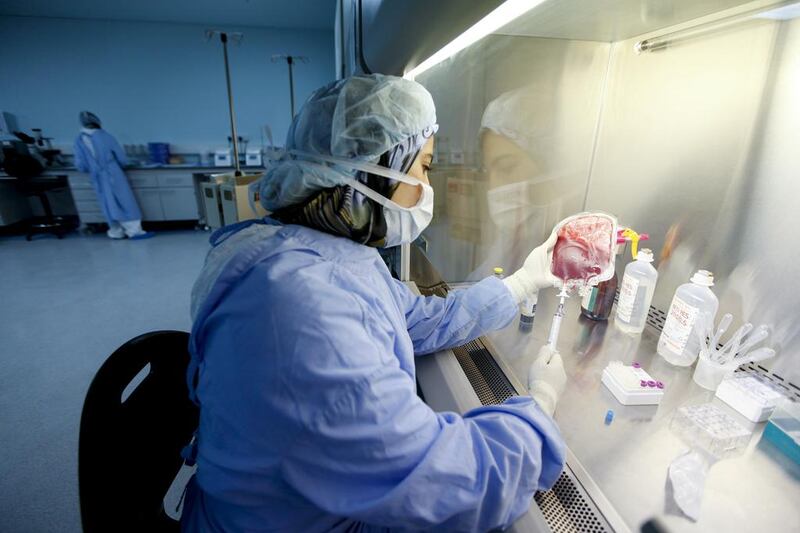DUBAI // It is a harmless procedure that involves taking blood from a newborn’s umbilical cord.
But not enough mothers are choosing to make a donation that could save the lives of others, health professionals say.
The Dubai Cord Blood and Research Centre (DCRC) has been collecting stem cells to build a registry in the UAE since 2006.
So far, it has collected 3,377 samples from the blood inside umbilical cords, which is a rich source of stem cells that can be used to treat more than 80 diseases.
Of those samples, nine have been transplanted into children with diseases such as thalassaemia and leukaemia.
“Since the inception of this centre, we have seen an increase in the awareness levels among the public about cord blood banking, and this has led to an increase in the number of people who save their cord blood with us,” said Kareema Al Arrayed, head of the DCRC.
“However, we need to raise awareness that cord-blood stem cells can be donated.”
Ms Al Arrayed said there was a shortage of cord-blood donations from Arab families.
Patients who need stem cells are more likely to find a genetic match from donors of the same ethnic background.
“The DCRC encourages families to donate cord-blood stem cells so that we have a strong UAE public registry to help people in need,” she said.
“Stem cells are the future of medicine and public banking is a trend that is catching on globally due to the several diseases stem cells can cure.”
Last year, the DCRC successfully preserved 326 stem cell units, a rise of 50 per cent in three years.
“Today, mothers are aware of the benefit of this simple procedure. That’s why we are seeing a steady rise in the number of women who opt for cord blood collection at the time of birth,” Ms Al Arrayed said.
“They understand it is a form of health insurance.”
Fatma Al Hashimi, acting head of administration at DCRC, said publicity campaigns conducted by the centre had achieved some success.
“The drives have made a big difference. As people have come to know, they have come forward to save their cord-blood stem cells,” Ms Al Hashimi said.
Donating stem cells is simple and free process, she said.
“The blood from her placenta is taken and the process is not painful to either mother or child,” Ms Al Hashimi said. “In most cases, it only takes 8 to 10 minutes for the nurse to collect it.”
Ms Al Hashimi has been involved in many campaigns to encourage people to donate, including roadshows to educate nurses and doctors, campaigns at schools and colleges and hospital visits.
“We talk to pregnant women while they are waiting to see the doctor and tell them about the process of donating their cord blood,” Ms Al Hashimi said.
She said there were also cultural issues stopping some women from donating.
A DCRC questionnaire of pregnant women found “that there is a lack of knowledge about stem cells,” said Ms Al Hashimi.
“People don’t know what stem cells are.
“Also, some people think donating cord-blood stem cells isn’t Islamic, although it is.
“It is just like blood being donated. Men need to be educated on this subject as well, as husbands at times do not allow their wives to donate their cord blood.”
DCRC provides a tour for pregnant women and families interested in preserving stem cells for their families or for donation.
Ms Al Hashimi believes the issues surrounding cord-blood stem cells should be taught at schools and universities so youngsters can understand the benefits.
“These students are the mothers of the future and they need to be educated in this,” she said.
Prospective donors can contact the centre where they can check if they are eligible for donating their cord-blood stem cells.
arizvi2@thenational.ae






